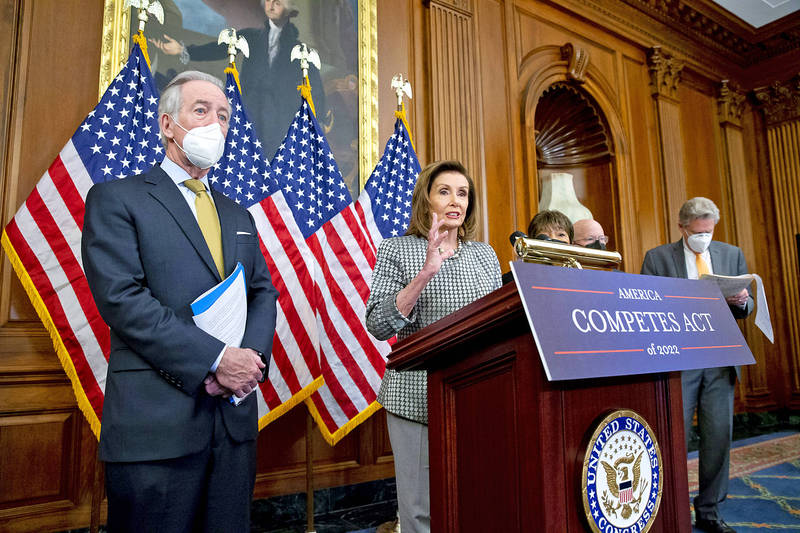《TAIPEI TIMES》 US House backs sweeping China competition bill

US House of Representatives Speaker Nancy Pelosi, center, and House committee chairpeople vote on the “America COMPETES Act of 2022” in Washington on Friday. Photo: EPA-EFE
/ Reuters, WASHINGTON
The US House of Representatives on Friday narrowly passed a multibillion-dollar bill aimed at increasing US competitiveness with China and boosting domestic semiconductor manufacturing, despite Republican opposition.
The Democratic-majority House backed the “America COMPETES Act of 2022” by 222 to 210, almost entirely along party lines.
One Republican joined Democrats in voting for the measure, and one Democrat voted against.
The vote took place hours after the opening ceremony for the Beijing Winter Olympics, amid criticism in the US Congress of the International Olympic Committee for awarding the Games to China.
Human rights groups have long criticized China’s rights record, allegations China denies.
The bill’s passage by the House set up negotiations with the US Senate on a compromise version of the legislation, which must pass both chambers before it can be sent to the White House for US President Joe Biden to sign.
The talks could take weeks or months, although Biden urged quick action in a statement praising what he called “vital” legislation.
“Every day we delay we fall farther behind, and that increases our domestic national security risk,” US Secretary of Commerce Gina Raimondo told a news conference.
The House bill authorizes almost US$300 billion for research and development, including US$52 billion to subsidize semiconductor manufacturing and research into the key components. It also earmarks US$45 billion over six years to ease supply chain problems that have exacerbated shortages.
It includes changes to US trade rules intended to offset China’s market distorting trade practices, including by strengthening antidumping rules.
The bill would authorize US$8 billion in US contributions to the Green Climate Fund, established by the Paris Agreement to combat climate change and help developing countries cope.
House Speaker Nancy Pelosi told reporters before the vote that she intended to begin negotiations with the Senate quickly.
“It is about making America ... self-sufficient when it comes to the supply chain, so that we’re not depending on other countries,” she said.
Raimondo said companies had told the White House that without the chips funding, they would build new plants outside the US.
The Semiconductor Industry Association praised the bill.
Arizona Technology Council president Steve Zylstra said the bill was “profoundly important” to the state’s ambitions of becoming the center of excellence for semiconductors in the US, after Intel Corp and Taiwan Semiconductor Manufacturing Co (台積電) have announced plans to build new plants there.
House Republicans complained that Democrats did not include them in drafting the legislation.
They harshly criticized the climate provisions, saying that they could be used to help Beijing, and accused Democrats of using the China measure to advance parts of Biden’s economic agenda that could not pass the Senate.
House Democrats said Republicans had refused to engage with them while they wrote the legislation.
The bill includes all or part of more than 60 smaller measures that Republicans had cosponsored, they added.
The Senate passed its own bill — the “US Innovation and Competition Act” — by 68 to 32 in June last year. Eighteen Republicans joined every Senate Democrat in voting “yes.”
That legislation includes US$52 billion to increase domestic semiconductor production, and authorizes US$190 billion for US technology and research to compete with China.
The House bill also includes some pro-Taiwan provisions previously initiated by lawmakers.
These include the draft “Taiwan Fellowship Act,” “Taiwan Diplomatic Review Act,” “Taiwan Peace and Stability Act” and “Taiwan International Solidarity Act,” as well as the Taiwan Allies International Protection and Enhancement Initiative (TAIPEI) Act.
The Taiwan Diplomatic Review Act asks the US secretary of state to negotiate a name change for the Taipei Economic and Cultural Representative Office in the US, Taiwan’s de facto embassy in Washington.
In Taipei, the Ministry of Foreign Affairs thanked the US Congress for its continuous efforts to deepen Taiwan-US relations through legislation and other actions that demonstrate strong support for Taiwan.
The ministry said it would monitor the follow-up review of the House bill and maintain close contact with friends in Congress to deepen the close partnership between the two countries.
Democratic Progressive Party (DPP) spokeswoman Hsieh Pei-fen (謝佩芬) said in a news release that the DPP appreciates the House’s cross-party support for Taiwan and looks forward to the continued deepening of bilateral relations with the US.
Hsieh said that many breakthroughs in Taiwan-US relations in the past few years have depended on congressional support, for which the DPP is deeply grateful.
Additional reporting by CNA
新聞來源:TAIPEI TIMES

The nameplate of the Taipei Economic and Cultural Representative Office in Washington is pictured in an undated photograph. Photo: Lu Yi-hsuan, Tapei Times

















